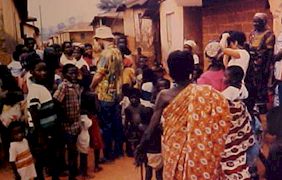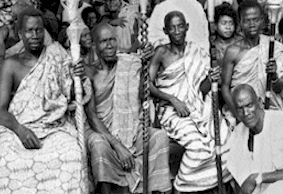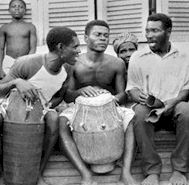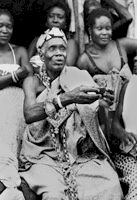![]()
 It
was through a wonderful group of Ghanaian students at IU, especially Owusu
Brempong, Kwesi Yankah, Kofi Anyidoho, Daniel Avorgbedor, and David Adu-Amankwa that I became
aware of the treasures of Ghanaian folklore.
And it was through the good offices of Professor Yankah, in
particular, that I sought and received a Fulbright Lectureship to spend a
half-year in Ghana as a visiting lecturer at the University of Ghana in
Legon. My wife, Patricia Glushko, a skilled photographer, traveled with me
to Ghana in September of 1987 and there we remained through February of
1988. My assignment was to teach, not to conduct research, but it
chanced that the students were on strike for much of the remainder of
1987, which left us free to explore the byways of Ghana until classes
resumed in mid-December. Our
trips took us to several regions of Ghana: to a Ga village; to Duakwa,
Kwesi's town in the Fanti region, where something interesting always
seemed to await us; to the Ewe region across the Volta River; and to
Kumasi, the Asanti stronghold. Because
we were well-attended and well-received, we were able to witness and
document many traditional events, including festivals and funerals, with
their welcome quotas of libations, drumming, singing and dancing.
It
was through a wonderful group of Ghanaian students at IU, especially Owusu
Brempong, Kwesi Yankah, Kofi Anyidoho, Daniel Avorgbedor, and David Adu-Amankwa that I became
aware of the treasures of Ghanaian folklore.
And it was through the good offices of Professor Yankah, in
particular, that I sought and received a Fulbright Lectureship to spend a
half-year in Ghana as a visiting lecturer at the University of Ghana in
Legon. My wife, Patricia Glushko, a skilled photographer, traveled with me
to Ghana in September of 1987 and there we remained through February of
1988. My assignment was to teach, not to conduct research, but it
chanced that the students were on strike for much of the remainder of
1987, which left us free to explore the byways of Ghana until classes
resumed in mid-December. Our
trips took us to several regions of Ghana: to a Ga village; to Duakwa,
Kwesi's town in the Fanti region, where something interesting always
seemed to await us; to the Ewe region across the Volta River; and to
Kumasi, the Asanti stronghold. Because
we were well-attended and well-received, we were able to witness and
document many traditional events, including festivals and funerals, with
their welcome quotas of libations, drumming, singing and dancing.
![]()
 A
GA LIBATION
A
GA LIBATION
From my field notes:
We saluted the chief and his
advisors and took our seat on a low wooden bench. The drummers played at
intervals and there was some dancing. I turned on the tape recorder from
the outset, but when we asked if we could take some pictures, it
triggered a problematic incident. The woman who was helping us made the
request to the elders, but one large woman stirred up a bit of a ruckus,
and there was some talk that we would take the photos and use them for a
calendar. A few people came by to require a donation, but Kwesi was
adamantly opposed to this idea. He feels that donations are fine but
they should be purely voluntary. For a little while things were a bit
tense and we considered beating a retreat, but eventually we secured
permission to take the pictures, which they understood to be a request
for posed portraits, of the fetish priestesses, of the chief and his
advisors, of the drummers. By the time all this fell into place, it was
getting a little dark -- Pat had to downstop to 60 and even so the light
meter indicated barely enough light available.
 I think the mood changed when I
suddenly jumped up, saluted the chief, and performed a dance solo to one
segment of the drumming. My clumsy efforts produced a great shout of
approval, and the chief requested Pat to dance the next segment, which
she did to even greater shouting of approval. After that we felt quite
at home and the tension of the previous hour evaporated. As it was
getting late, I offered to contribute some 800 cedies to the welfare of
the village. The woman helper took this money and handed it to the
Linguist (a counselor of the chief) who immediately sent out for a
bottle of gin. They insisted that we stay long enough for libations, and
that turned out to be very interesting. The Linguist (who had a wooden
staff painted red, as an emblem of his office) intoned a libation
prayer, spilling gin from a small cup made from a cocoanut, but the real
libation poet was another advisor to the chief who recited two libations
to the accompaniment of quiet handclapping and a choral background. I
have all this on tape and hope to work with a Ga speaker to obtain a
transcription and a translation.
I think the mood changed when I
suddenly jumped up, saluted the chief, and performed a dance solo to one
segment of the drumming. My clumsy efforts produced a great shout of
approval, and the chief requested Pat to dance the next segment, which
she did to even greater shouting of approval. After that we felt quite
at home and the tension of the previous hour evaporated. As it was
getting late, I offered to contribute some 800 cedies to the welfare of
the village. The woman helper took this money and handed it to the
Linguist (a counselor of the chief) who immediately sent out for a
bottle of gin. They insisted that we stay long enough for libations, and
that turned out to be very interesting. The Linguist (who had a wooden
staff painted red, as an emblem of his office) intoned a libation
prayer, spilling gin from a small cup made from a cocoanut, but the real
libation poet was another advisor to the chief who recited two libations
to the accompaniment of quiet handclapping and a choral background. I
have all this on tape and hope to work with a Ga speaker to obtain a
transcription and a translation.
 The libation complete, we took our
leave, promising to return with copies of the photos we took. On the way
back I chatted with some high school boys from the village whom we gave
a lift to into Accra. They said the name of the village is Oshieye and
the chief's name is Oshieye. Each of the fetish princesses dances for
a different deity. They are chosen mostly through possession by the god.
I have been surprised how alive the traditional gods are, in spite of a
very visible surface of fervent Christianity. At the first village we
visited on Sunday (in the Aburi hills) Kwesi's friend and our guide
pointed to a wooded grove at the edge of town and said: "Our Gods live
here." Traditional village culture persists here, even in this
cultural haven of West Africa.
The libation complete, we took our
leave, promising to return with copies of the photos we took. On the way
back I chatted with some high school boys from the village whom we gave
a lift to into Accra. They said the name of the village is Oshieye and
the chief's name is Oshieye. Each of the fetish princesses dances for
a different deity. They are chosen mostly through possession by the god.
I have been surprised how alive the traditional gods are, in spite of a
very visible surface of fervent Christianity. At the first village we
visited on Sunday (in the Aburi hills) Kwesi's friend and our guide
pointed to a wooded grove at the edge of town and said: "Our Gods live
here." Traditional village culture persists here, even in this
cultural haven of West Africa.
Text of Ga Libation
Elder:
Agoo! Agoo! Tsemei
Agoo!
Agoo! Fathers
Amee!
Response:
Amee!
Elder:
Mene ashi me?
Today is what day?
Response:
Mene ashi hכgbaa
[5]
Today is Sunday
Elder:
Miimi ahכgbaa
Our Father's Sunday
Maame
ahכbaa
Our Mother's Sunday
Mawu bo kenklen baa
tsכnaa oha
wכni
eyi obכn
God you be the first to taste that
it may be full to the brim
Ei!
Odכ baa he eko onu okwashi okwa den
Ei!
Odכ , come for some and drink
that you may protect us
Shikpכn tse baa he
eko onu
[10]
Owner of our earth, come for some
and drink
Mene baa he eko onu
Mene come for some and drink
Nana Otu Kwadzen
baa he eko onu
Nana Otu Kwadzen come for some and
drink
Maa
כokכ bi, Maa Amerbey
Maa
כotכ's daughter, Maa Amerbey
Ten
bi Ten
Ten's son, Ten
Nye fee nyeba hea eko nye nua
[15]
All of you come for some and drink
Máa!
Màa Saafia baa he eko onu
Máa! Mother Saapia come for some
and drink
WB tse Kwoshie
baa he eko onu
Our father Kwoshie come for some
and drink
Máa!
Màa Sakumכ
baa he eko onu ni okwa den
Maa! Mother Sakumכ
come for some and drink and protect us
Ke dze ne_ma
ke ashi adasurכ
wכskee
moko, wכshii moko
From south to north we call no one
yet we leave no one out
Leele!
Nii nidzi Mii Oshie etsofa dzin ekwe Ga me [20]
Truly! Nii, that's Nii Oshie
using his medicines to nurse Ga people
Leele! Nye see, otsi le,
wכgbe fee
na
Truly! Before yesterday, last week,
we finished all
Wכ dzi enaa gbee
Tomorrow we bring it to an end
Hewכ nye kenklen nye ba hea eko nye
nua
So you all be the first to come and
drink
Aye
כtampo abonsam ni le ekee ekplee
wכ ye mã
The
witch and enemy of a devil who
would not let us have our peace
in this land
Wכ
dzככ le,
wכ
dzככ le
[25]
We bless him, we bless him
Hoo!
Hoo!
Response:
Wכ
dzככ le,
wכ
dzככ le
We bless him, we bless him
Hoo!
Hoo!
Elder:
Wכ ke
wכ kpa dzna le
We bind him with our rope
Response:
Egbo
[30]
He is dead
Elder:
A wa eyi
Hoot at him
Response:
Hoo! Hoo!
Song
Elder:
Kpãã
wכ noni
The Kpãã is for us
Wכ shee le gbeyee Kraa
So we are not afraid of it at all
Omu ni oke noko shwee shi oke shwee
eflo
Whosoever put something on the
ground does it in vain
Response:
Eflo
In vain
Elder:
Hee! Kwa! Fante me kee "kwa"
[5]
Twa! Omanye aba
Twa! Let there be peace!
Response:
Yao!
[1]Odכ
is the name of a river that flows into Klore Lagoon.
[2]Nana
is the term for "king." Nana Otu Kwazden is an important ancestor.
[3]Kwoshie
was perhaps the founder of the town.
[4]Maa
Sakumכ is a godess of the
Sakumכ Lagoon.
[5]A
festive dance featuring songs of verbal abuse.
Last Modified Jan 30, 2023